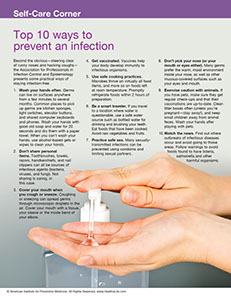SYMPTOM CHECKER
CONDITIONS
Male
Female
Child
Arm, Hand & Shoulder Concerns
Legs & Feet Concerns
Dental & Mouth Concerns
Ear & Nose
Eye Conditions
Head Conditions
Arm, Hand & Shoulder Concerns
Legs & Feet Concerns
Front
Back
Arm, Hand & Shoulder Concerns
Dental & Mouth Concerns
Ear & Nose
Eye Conditions
Head Conditions
Arm, Hand & Shoulder Concerns
Dental & Mouth Concerns
Ear & Nose
Eye Conditions
Head Conditions
Front
Back
Arm, Hand & Shoulder Concerns
Neck Links
Head & Neck Concerns
Arm, Hand & Shoulder Concerns
Neck Links
Head & Neck Concerns
Front
Back
Online Clinic
Wise Healthcare
Top 10 ways to prevent an infection
Print on Demand
Beyond the obvious—steering clear of runny noses and hacking coughs—the Association for Professionals in Infection Control and Epidemiology presents some practical ways of staying infection-free.
1. Wash your hands often. Germs can live on surfaces anywhere from a few minutes to several months. Common places to pick up germs are kitchen sponges, light switches, elevator buttons, and shared computer keyboards and phones. Wash your hands with good old soap and water for 20 seconds and dry them with a paper towel. When you can’t wash your hands, use alcohol-based gels or wipes to clean your hands.
2. Don’t share personal items. Toothbrushes, towels, razors, handkerchiefs, and nail clippers can all be sources of infectious agents (bacteria, viruses, and fungi). Not sharing is caring, in this case.
3. Cover your mouth when you cough or sneeze. Coughing or sneezing can spread germs through microscopic droplets in the air. Cover your mouth with a tissue, your sleeve or the inside bend of your elbow.
4. Get vaccinated. Vaccines help your body develop immunity to infectious organisms.
5. Use safe cooking practices. Microbes thrive on virtually all food items, and more so on foods left at room temperature. Promptly refrigerate foods within 2 hours of preparation.
6. Be a smart traveler. If you travel to a location where water is questionable, use a safe water source such as bottled water for drinking and brushing your teeth. Eat foods that have been cooked. Avoid raw vegetables and fruits.
7. Practice safe sex. Many sexually-transmitted infections can be prevented using condoms and limiting sexual partners.
8. Don’t pick your nose (or your mouth or eyes either). Many germs prefer the warm, moist environment inside your nose, as well as other mucous-covered surfaces such as your eyes and mouth.
9. Exercise caution with animals. If you have pets, make sure they get regular check-ups and that their vaccinations are up-to-date. Clean litter boxes often (unless you’re pregnant—stay away!), and keep small children away from animal feces. Wash your hands after playing with pets.
10. Watch the news. Find out where outbreaks of infectious diseases occur and avoid going to those areas. Follow warnings to avoid foods found to have listeria, salmonella and other harmful organisms.
This website is not meant to substitute for expert medical advice or treatment. Follow your doctor’s or health care provider’s advice if it differs from what is given in this guide.
The American Institute for Preventive Medicine (AIPM) is not responsible for the availability or content of external sites, nor does AIPM endorse them. Also, it is the responsibility of the user to examine the copyright and licensing restrictions of external pages and to secure all necessary permission.
The content on this website is proprietary. You may not modify, copy, reproduce, republish, upload, post, transmit, or distribute, in any manner, the material on the website without the written permission of AIPM.
2021 © American Institute for Preventive Medicine - All Rights Reserved. Disclaimer | www.HealthyLife.com
















































